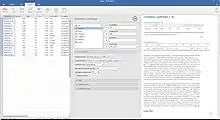Jamovi
Jamovi (stylized in all lower-case as jamovi) is a free and open-source computer program for data analysis and performing statistical tests. The core developers of Jamovi are Jonathon Love, Damian Dropmann, and Ravi Selker who are developers for the JASP project.[2] Jamovi is a fork of JASP[3]
 | |
 | |
| Stable release | 2.4.8
/ August 24, 2023[1] |
|---|---|
| Repository | Jamovi Github page |
| Written in | C++, R, JavaScript |
| Operating system | Microsoft Windows, Mac OS X, Linux, and ChromeOS |
| Type | Statistics |
| License | GNU Affero General Public License and GNU General Public License |
| Website | www |
Software
Jamovi is an open source graphical user interface for the R programming language.[4] It is used in statistical research, especially as a tool for ANOVA (analysis of variance) and to understand statistical inference.[5][6] It also can be used for linear regression,[7] mixed models and Bayesian models.[8]
Data is entered into a spreadsheet interface[9] that can be imported into Jamovi. The analyses produced by the software are automatically updated to reflect changes made to the raw data.[7] The software includes a multinomial test to determine whether observed data differs from researchers' predictions.[10]
Extendibility
Users can modify the base program and extend its functionality using community created open source add-on modules.[11][12] These modules are written in the R programming language and make use of the jmv[13] and jmvtools[14] libraries to create the interface and display code. Numerous modules exist and can be accessed in the curated library within jamovi. Over 40 modules[15] have been created by the jamovi community and extend the functionality of the program. These additional analyses include agreement and reliability analyses[16] mediation models,[17][18] meta-analysis,[15] power analysis,[19] psychometrics,[20] structural equation models,[21] survival analysis,[22] and likelihood/evidential analyses.[23] [24]
Documentation
A detailed user manual is available for Jamovi. Third party learning resources are also available including free books and video tutorials in multiple languages including Chinese, Hindi, Spanish, Korean, and Malayalam [25]
External links
References
- "Release notes - jamovi".
- Edelsbrunner, Peter (2017-03-23). "Introducing jamovi: Free and Open Statistical Software Combining Ease of Use with the Power of R". JEPS Bulletin. Retrieved 2022-05-28.
- "Introducing jamovi: Free and Open Statistical Software Combining Ease of Use with the Power of R". 23 March 2017.
- Richardson, Paul; Machan, Laura (2021). Jamovi for psychologists. Laura MacHan (1st ed.). London. ISBN 978-1-352-01185-2. OCLC 1247685958.
{{cite book}}: CS1 maint: location missing publisher (link) - Kamden K. Strunk; Mwarumba Mwavita (2021). Design and analysis in educational research using Jamovi: ANOVA designs. Abingdon, Oxon: Routledge. ISBN 9780367723088. Retrieved 20 September 2022.
- Hayhoe, George F.; Brewer, Pam Estes (2020-09-10). A Research Primer for Technical Communication: Methods, Exemplars, and Analyses. Routledge. ISBN 978-1-000-17775-6.
- Richardson, Paul; Machan, Laura (2021-03-21). Jamovi for Psychologists. Bloomsbury Publishing. ISBN 978-1-350-92876-3.
- Brysbaert, Marc (2019-10-05). Basic Statistics for Psychologists. Bloomsbury Publishing. p. 494. ISBN 978-1-137-60747-8.
- Şahin, Murat; Aybek, Eren (2019-12-20). "Jamovi: An Easy to Use Statistical Software for the Social Scientists". International Journal of Assessment Tools in Education. 6 (4): 670–692. doi:10.21449/ijate.661803. ISSN 2148-7456. S2CID 213495330.
- Leppink, Jimmie (2019-05-30). Statistical Methods for Experimental Research in Education and Psychology. Springer. pp. 97–101. ISBN 978-3-030-21241-4.
- Davis, C. (ed.) (2019) Statistical testing with jamovi and JASP open source software Psychology. Vor Press.
- "Module Development for Jamovi". www.serdarbalci.com. Retrieved 2022-08-31.
- Selker R, Love J, Dropmann D, Moreno V (2022). jmv: The 'jamovi' Analyses. R package version 2.3.4, https://CRAN.R-project.org/package=jmv
- Love J (2022). jmvtools: tools to build jamovi modules. R package version 2.3.4.
- "jamovi library". www.jamovi.org. Retrieved 2022-08-31.
- Caldwell, Aaron R. (2022-03-22). "SimplyAgree: An R package and jamovi Module for Simplifying Agreement and Reliability Analyses". Journal of Open Source Software. 7 (71): 4148. Bibcode:2022JOSS....7.4148C. doi:10.21105/joss.04148. ISSN 2475-9066. S2CID 247636856.
- Gallucci, M. (2019). jAMM: jamovi Advanced Mediation Models.[jamovi module].
- Gallucci, M. (2021). PATHj: jamovi Path Analysis.[jamovi module].
- Morey, Richard (2022-08-22). "jpower". GitHub. Retrieved 2022-08-31.
- Hyunsoo Seol (2020). Understanding and using the jamovi statistical program (3rd ed.). Seoul: Hakjisa
- Gallucci, Marcello & Jentschke, Sebastian SEMLj: A Suite for Structural Equation Models for jamovi, semlj, 2022-08-02, retrieved 2022-08-31
- Balcı, Serdar (2022-08-30). "ClinicoPath Jamovi Module". Open Science Framework. doi:10.17605/OSF.IO/9SZUD.
{{cite journal}}: Cite journal requires|journal=(help) - Cahusac, Peter. "Calculating Log Likelihood Ratios (LLRs) using the jeva module". Retrieved 2023-05-03.
- Cahusac, Peter (2023). "Log Likelihood Ratios for Common Statistical Tests Using the likelihoodR Package". The R Journal. 14 (3): 203–212. doi:10.32614/RJ-2022-051. ISSN 2073-4859. S2CID 256128278.
- jamovi. (2023). Community. Retrieved April 6, 2023, from https://www.jamovi.org/community.html